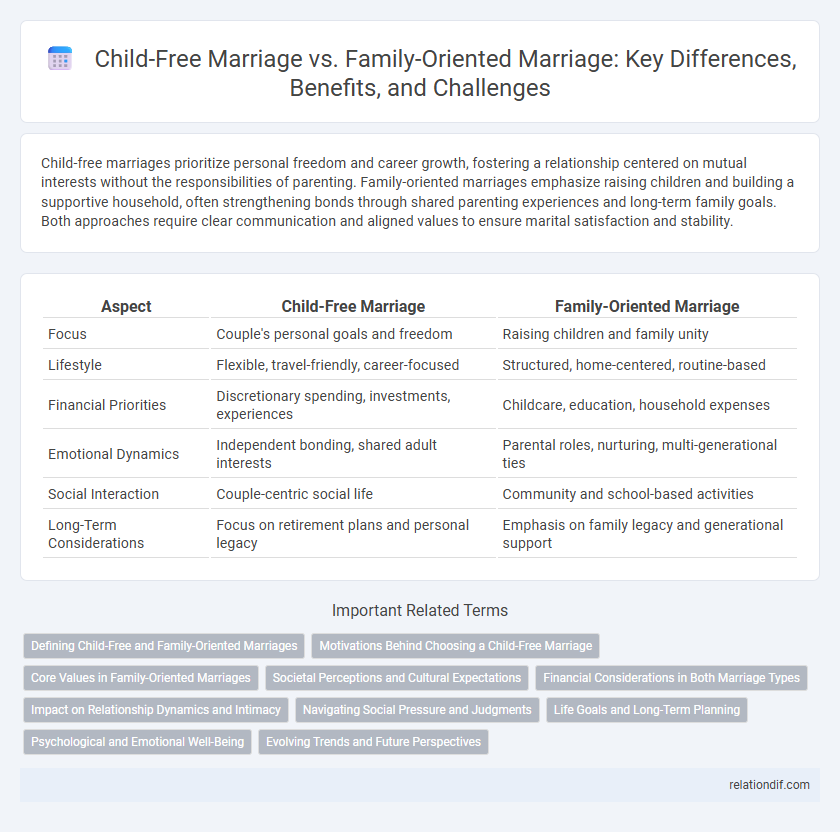Child-free marriages prioritize personal freedom and career growth, fostering a relationship centered on mutual interests without the responsibilities of parenting. Family-oriented marriages emphasize raising children and building a supportive household, often strengthening bonds through shared parenting experiences and long-term family goals. Both approaches require clear communication and aligned values to ensure marital satisfaction and stability.
Table of Comparison
| Aspect | Child-Free Marriage | Family-Oriented Marriage |
|---|---|---|
| Focus | Couple's personal goals and freedom | Raising children and family unity |
| Lifestyle | Flexible, travel-friendly, career-focused | Structured, home-centered, routine-based |
| Financial Priorities | Discretionary spending, investments, experiences | Childcare, education, household expenses |
| Emotional Dynamics | Independent bonding, shared adult interests | Parental roles, nurturing, multi-generational ties |
| Social Interaction | Couple-centric social life | Community and school-based activities |
| Long-Term Considerations | Focus on retirement plans and personal legacy | Emphasis on family legacy and generational support |
Defining Child-Free and Family-Oriented Marriages
Child-free marriage is defined by a mutual decision between partners to intentionally avoid having children, focusing instead on personal growth, career goals, and shared experiences. Family-oriented marriage centers on raising children and creating a nurturing environment, where parenting and family activities are core priorities. Both marriage types reflect differing values and lifestyle choices that shape the couple's long-term goals and daily dynamics.
Motivations Behind Choosing a Child-Free Marriage
Choosing a child-free marriage often stems from motivations such as the desire for personal freedom, career focus, and environmental concerns. Couples may prioritize financial stability, lifestyle flexibility, and avoiding the responsibilities associated with parenting. This decision reflects evolving societal values that recognize individual fulfillment beyond traditional family structures.
Core Values in Family-Oriented Marriages
Core values in family-oriented marriages emphasize commitment, nurturing, and intergenerational support, fostering emotional bonds and stability. These marriages prioritize raising children and creating a legacy, often aligning with cultural and societal expectations of family roles. Strong communication, shared responsibilities, and mutual respect underpin the growth of a cohesive family unit in this marriage type.
Societal Perceptions and Cultural Expectations
Child-free marriages often challenge traditional societal norms, facing skepticism or misunderstanding in cultures that prioritize lineage and offspring. Family-oriented marriages align with cultural expectations emphasizing procreation and multigenerational support, reinforcing social status and community ties. Societal perceptions heavily influence marital choices, with stigmatization of child-free couples varying significantly across different regions and social groups.
Financial Considerations in Both Marriage Types
Child-free marriages often see higher disposable income due to the absence of child-related expenses, allowing couples to invest more in personal goals, savings, and lifestyle enhancements. Family-oriented marriages typically allocate significant portions of their budget to child-rearing costs such as education, healthcare, and extracurricular activities, impacting long-term financial planning and retirement savings. Analyzing financial considerations reveals distinct spending patterns and priorities that influence wealth accumulation and economic resilience in both marriage types.
Impact on Relationship Dynamics and Intimacy
Child-free marriages often experience enhanced intimacy and greater freedom in relationship dynamics, allowing couples to prioritize personal growth and shared experiences without parental obligations. Family-oriented marriages typically foster deep emotional bonds through collective responsibilities, which can strengthen commitment but may also introduce stressors related to childcare and time management. Both marriage types require effective communication and mutual support to maintain a healthy and satisfying partnership.
Navigating Social Pressure and Judgments
Couples in child-free marriages often face societal expectations to have children, encountering judgments that can affect their relationship dynamics. Family-oriented marriages may experience pressure to conform to traditional roles, balancing personal desires with external demands. Navigating these social pressures requires clear communication and mutual support to maintain a healthy partnership regardless of the chosen marital path.
Life Goals and Long-Term Planning
Child-free marriages prioritize personal freedom, career growth, and lifestyle flexibility, aligning life goals with individual pursuits rather than traditional family structures. Family-oriented marriages emphasize raising children, legacy building, and long-term planning that includes education, inheritance, and emotional bonds. Both approaches require clear communication and shared vision to ensure aligned expectations and fulfillment over time.
Psychological and Emotional Well-Being
Child-free marriages often report higher levels of personal autonomy and lower stress related to parenting responsibilities, contributing to psychological well-being through greater freedom and self-focused growth. Family-oriented marriages, while potentially experiencing increased demands and stress, benefit from emotional fulfillment derived from nurturing children, which can enhance long-term life satisfaction and relational bonding. Studies indicate that both marriage types can support emotional well-being, with outcomes heavily influenced by individual expectations, communication quality, and mutual support between partners.
Evolving Trends and Future Perspectives
Marriage patterns reveal a growing trend toward child-free unions, driven by shifting social values, increased career focus, and rising environmental concerns. Family-oriented marriages continue to emphasize traditional roles and multigenerational support but face challenges aligning with modern lifestyle demands. Future perspectives suggest hybrid models prioritizing personal fulfillment and flexible family constructs, reflecting evolving individual and societal priorities.
Child-Free Marriage vs Family-Oriented Marriage Infographic

 relationdif.com
relationdif.com